AMERICA - WE ARE THE WORLD'S BIGGEST IDIOTS!
THE SAUDI MUSLIM INVASION OF AMERICA
Images of 9/11: A Visual Remembrance
https://www.breitbart.com/politics/2020/09/11/images-911-visual-remembrance/
Images of 9/11: A Visual Remembrance
Pentagon suspends military training of Saudi students after Pensacola shooting
- Decision grounds more than 300 military aviation students
- Three US military members were killed in shooting Friday
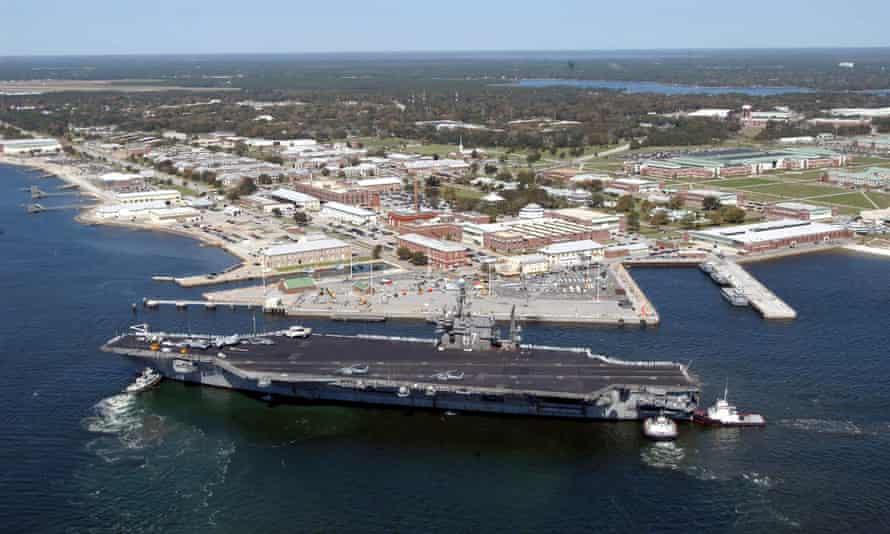
The Pentagon announced on Tuesday it was halting operational training of all Saudi Arabian military personnel in the United States until further notice in the wake of the deadly shooting by a Saudi air force officer.
The decision will have far-reaching impacts, including grounding more than 300 Saudi Arabian military aviation students.
The Pentagon has also ordered a broad review of vetting procedures for international students who participate in training on US military installations and demanded the process be strengthened.
The memo signed by the deputy defense secretary, David Norquist, said the review of the vetting must be completed in 10 days, and the flight restrictions will continue throughout the review and until they are lifted by senior leaders.
There are about 850 Saudi students currently in US military training programs, according to the Pentagon. US officials said they aren’t sure how many of those would see some type of flight or other restriction, but many will.
The FBI has said US investigators believe the Saudi air force Second Lieutenant Mohammed Saeed Alshamrani, 21, acted alone when he attacked a US navy base in Pensacola, Florida, on Friday, before he was fatally shot by a deputy sheriff.
The shootings have again raised questions about the US military relationship with Saudi Arabia, which has come under heightened scrutiny over the war in Yemen and Saudi Arabia’s killing of the Washington Post columnist Jamal Khashoggi last year.
Still, US military leaders have sought to portray this as a localized issue which would not affect the overall US-Saudi relationship.
The US navy spokeswoman Lieutenant Andriana Genualdi said the safety standdown and operational pause began on Monday for Saudi Arabian aviation students.
She said the grounding included three different military facilities: Naval Air Station Pensacola, Naval Air Station Whiting Field and Naval Air Station Mayport, all in Florida. The US air force said its groundings of Saudi aviation students also applied to additional US bases.
“Given the traumatic events, we feel it is best to keep the Royal Saudi Air Force students off the flying schedule for a short time,” the air force spokeswoman said.
The US defense secretary, Mark Esper, has dismissed suggestions that the shootings might make him more reluctant about new US deployments to Saudi Arabia, which were announced in October and first reported by Reuters.
“Saudi Arabia is a longstanding partner of ours in the region. We share mutual security interests,” Esper said over the weekend.
Esper said he had instructed the armed forces to review both security at military bases and screening for foreign soldiers who come to the United States for training after the shooting.
US to expel a dozen Saudi trainees in wake of Florida naval base shooting
Trainees not involved in attack but reportedly accused of having extremist links or possessing child abuse images
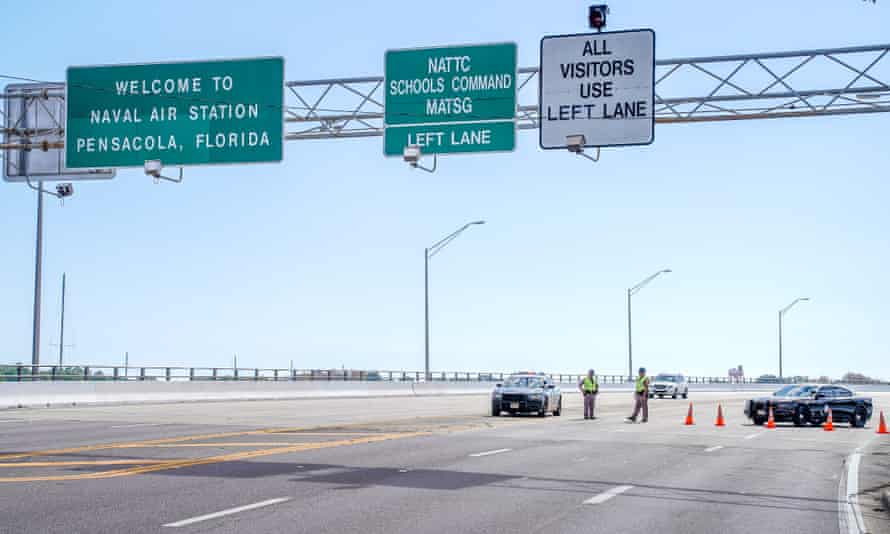
The US will expel at least a dozen Saudi military students accused of extremist links and possessing child sexual abuse images, after an investigation into a shooting rampage by a Saudi officer in Florida, according to media reports.
In December Mohammed Alshamrani, who was in the US as part of a Saudi military training program, opened fire in a classroom at the Pensacola naval air station, killing three sailors and wounding eight other people before being shot dead by police.
While the dozen or more trainees are not accused of aiding Alshamrani, some were found to have connections to extremist movements or be in possession of child sexual abuse material, CNN reported on Saturday.
The Pentagon referred questions to the justice department, which did not immediately respond to a request for comment. The FBI and the Saudi embassy in Washington did not immediately respond to requests for comment.
The probe, which was carried out by the FBI, also found that several had not reported the assailant’s disturbing behaviour before the attack, according to the Washington Post.
In mid-December the Pentagon said it had conducted background checks on all Saudi military personnel currently training in the US and found no “immediate threat scenario.”
Defense department officials halted operational training for Saudi military students in the US following the attack, though classroom instruction continued.
The 21-year-old gunman, a lieutenant in the Saudi air force, was armed with a lawfully purchased Glock 9mm handgun, and is reported to have posted a manifesto on Twitter before the shooting, denouncing America as “a nation of evil”.
According to the Washington Post, the FBI asked Apple to help access Alshamrani’s two iPhones, but the company is resisting governmental requests to alter encryption.
Apple said it had already helped the agency by sharing related data in its cloud storage.
Some 5,000 international military personnel are undergoing training in the US, including approximately 850 Saudis among all branches.
Joe Biden tells FBI to release files on 9/11 investigation – and possible Saudi links
Order responds to call by victims’ families suing Riyadh
Full record to be released over six months after review
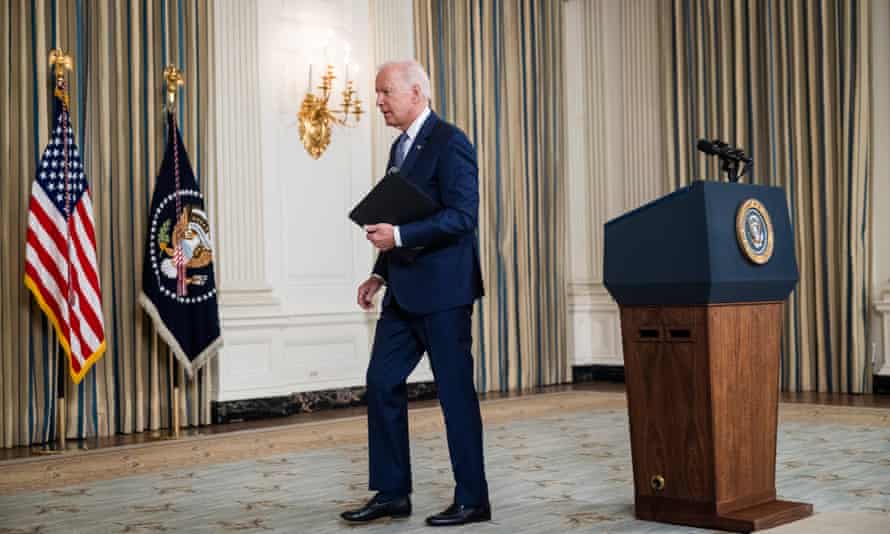
Joe Biden has announced the wholesale review and declassification of files from the investigation into the 9/11 attack, in response to intense pressure from Congress and victims’ families currently suing Saudi Arabia.
“As the 20th anniversary of 9/11 approaches, the American people deserve to have a fuller picture of what their government knows about those attacks,” an executive order issued on Friday said.
It said the full record would be disclosed in tranches over the coming six months “except when the strongest possible reasons counsel otherwise”.
The order said that while the “indiscriminate” release of information could jeopardise national security and the ability to prevent future attacks, a better balance had to be struck between transparency and accountability.
It said “information should not remain classified when the public interest in disclosure outweighs any damage to the national security”.
Victims’ families have long demanded the US release the findings of Operation Encore, a FBI investigation into possible Saudi complicity, particularly contacts between Saudi officials and two 9/11 hijackers who lived in California in the months before the attacks.
Riyadh has denied any involvement in the hijacking and is fighting a lawsuit brought by the families in federal court in New York.
The executive order comes a month after legislation was introduced with bipartisan support in Congress demanding greater transparency in the investigation.
“I’m very excited,” said Terry Strada, whose husband Tom died in the attack on the World Trade Center, and who is co-chair of a families and survivors group, 9/11 Community United.
“I’m thrilled that we have an executive order now that will mandate a full declassification review of all of the documents.”
Strada added: “The onus is now on the intelligence agencies to explain why they’re going to classify a document. The way that they’ve been doing it until now is under cover of darkness. They won’t be able to do that any longer.”
Under the executive order, an FBI electronic communication dated 4 April 2016 would have to be released by 11 September. The families’ lawyers believe that to be a 16-page summary of the Operation Encore findings.
The existence of that document was admitted by the US during the discovery process in the New York case, but its contents were not disclosed.
Within two months of the order, the FBI and other agencies will have to release “all other records that previously were withheld as classified, in full or in part, during discovery”, as well as another FBI electronic communication closing Operation Encore.
Within four months, the government will declassify “all interview reports, analytical documents, documents reporting investigative findings, or other substantive records (including phone records and banking records, if any)” from the FBI’s original investigation into the attacks (known as Penttbom), where there is any relevance to Operation Encore.
Within six months, the government must release anything relevant from any other investigation which concerns the hijackers and any “relationship with a foreign government”.
It will be up to the attorney general or the heads of the FBI or other agencies to prove that the release of any information “reasonably could be expected to result in damage to the national security”.
“The significant events in question occurred two decades ago or longer, and they concern a tragic moment that continues to resonate in American history and in the lives of so many Americans,” the executive order states.
“It is therefore critical to ensure that the United States government maximizes transparency, relying on classification only when narrowly tailored and necessary.”
The declassification is unlikely to resolve all the unanswered questions surrounding the 9/11 plot.
The executive order comes only a day after a complaint by the families to the justice department inspector general, over the FBI’s claim to have lost critical evidence, allegedly including photos and videotape of hijackers with Saudi officials, records of witness interviews and phone records of conversations among the plotters.
Brett Eagleson, whose father, Bruce, was killed in the attacks, said the families would be watching to see that the declassification is comprehensive.
“President Biden is asking us to trust that the administration will bring justice to the 9/11 community and we certainly hope this is a genuine step forward,” Eagleson said in a written statement.
“We will closely watch this process to ensure the justice department and FBI follow through, act in good faith and help our families uncover the truth in our pursuit of justice against the Saudi government. The first test will be on 9/11, and the world will be watching.”
Bush's sordid Saudi ties set template for Trump – he was just more subtle
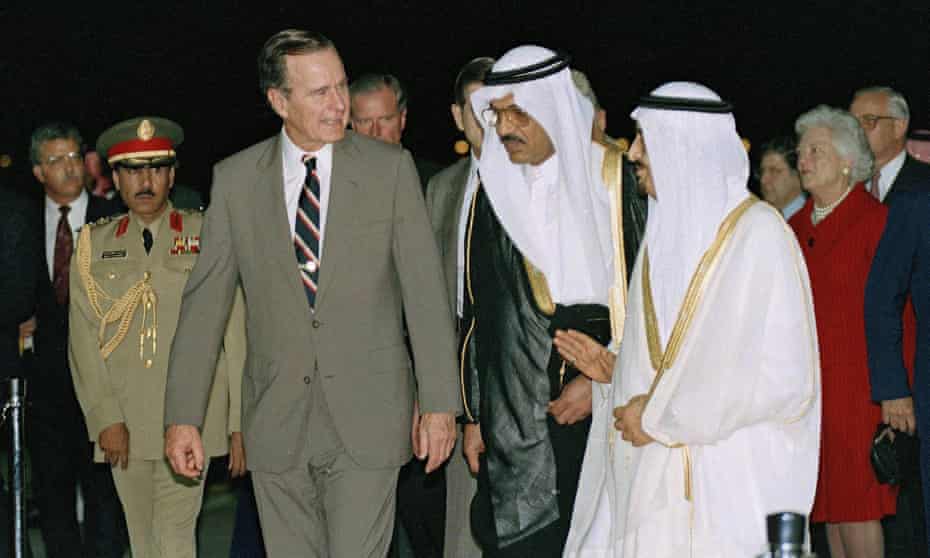
The former president has been widely praised for his command of foreign policy. The reality, writes the author of House of Bush, House of Saud, was much more complex – and dark
Days after his death, reverent tributes continue to pour in for former president George HW Bush, celebrating his adroit handling of the end of the cold war and his victorious leadership in the 1991 Gulf war, all leavened with nostalgia for a bygone era in which an American leader could stand astride the world stage without causing the entire planet to titter in nervous laughter.
Refined, gracious and genteel, Bush, in many ways, was the polar opposite of the current resident of the White House. Nevertheless, his decorous manner often concealed objectives that were far darker than the “kinder, gentler” vision he promoted.
As head of the CIA under Gerald Ford, and later as vice-president, Bush was a consummate pragmatist capable of rapidly changing political positions as expediency demanded. Highly disciplined, he mastered the arts of compartmentalization and secrecy. Nobody in government was better at keeping secrets. With his posh pedigree and Ivy League credentials, Bush had the perfect résumé to be a spy, and an effective mask with which to disguise his real agendas.
As Murray Waas and I wrote in the New Yorker, that was precisely the case in the summer of 1986, when Bush received a call from William J Casey, the gruff, perpetually disheveled spymaster who succeeded Bush as CIA director. Casey wanted Bush, then vice-president under Ronald Reagan, to run a covert operation that was part of what became known as the Iran-Contra and Iraqgate scandals.
Obstinate Iranian leaders had declined Casey’s secret offer to exchange arms for hostages who were being held in Beirut by terrorists tied to Tehran. Casey decided he had to force Iran’s hand. In August, Vice-President Bush was scheduled to visit the Middle East to “advance the peace process”, as the New York Times reported.
Bush’s true objectives were exactly the opposite of his stated goals. He was there to escalate the war between Iran and Iraq. Specifically, he had been tasked with delivering strategic military intelligence to Saddam Hussein, so that Iraq would intensify its bombing inside Iran. After a series of brutal air attacks, Bush and Casey reasoned, Iran would be forced to turn to the US for missiles and other weapons of air defense.
And they were right. Forty-eight hours after Bush executed his mission, Iraqis launched hundreds of strikes targeting oil facilities deep into Iran. Within a few weeks, Iran was back at the negotiating table. But that wasn’t the end of it. Every time hostages were released, new ones were seized.
As for the Iraqi side of ledger, Bush and Casey were far less wary of Saddam than one might expect. “He and Casey both had great naiveté, thinking you could be friends with Saddam Hussein,” said Howard Teicher, who served on Reagan’s National Security Council.
When Bush became president in 1989, his administration blithely ignored Saddam’s military buildup and human rights violations and proceeded to send funding, intelligence and hi-tech exports, some of which could potentially be used in Iraq’s nuclear weapons program. All of which left Saddam emboldened – and that paved the way for the Gulf war of 1991.
A key factor in Bush’s Middle East policies was his friendship with Prince Bandar, the Saudi ambassador to the US. The two men were so close that Bandar was known to pop in unexpectedly at Bush’s summer retreat in Kennebunkport, Maine. They went on hunting trips together. Later, when Bush was out of the White House, he even tasked Bandar with teaching his eldest son – George W, then a presidential aspirant with no experience in international affairs – all about foreign policy.
After his presidency was over, Bush and a number of his former cabinet officers also began participating in the Carlyle Group, a giant private equity firm heavily funded by Saudi billionaires – including the Saudi family of Osama bin Laden. As I reported in House of Bush, House of Saud, in the end, nearly $1.5bn made its way from the Saudis to individuals and institutions tied to the extended family of Bush cabinet officials and associates.
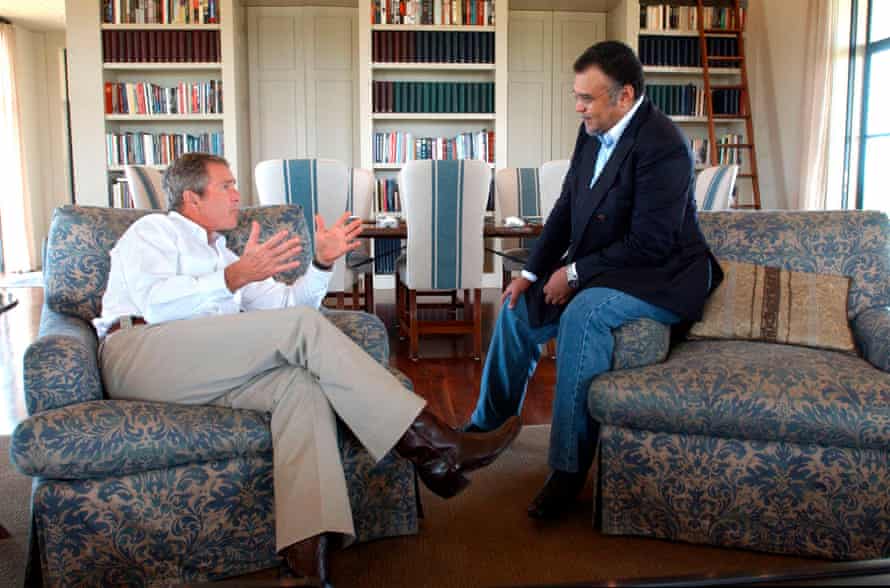
Such ties were particularly noteworthy because of the House of Saud’s alliance with strident and puritanical Wahhabi fundamentalists, many of whom supported a violent jihad against the west. All of which raised disturbing questions after terrorists murdered nearly 3,000 people on 11 September 2001 in attacks orchestrated by Bin Laden.
George HW Bush was long out of office and his son had become president. In the immediate aftermath of the terrorist attacks, when US air traffic was all but shut down, how is it that the White House approved the departure of more than 140 mostly Saudi passengers, many of whom were kin to Osama bin Laden? Why did Saudi Arabia – birthplace of 15 out of 19 hijackers – get preferential treatment from George W Bush’s White House at a time when Arab-Americans all over the country were being apprehended and interrogated? Had the Bushes’ close ties to the Saudis led them to look the other way – even after the worst terrorist attack in American history?
Seventeen years later, of course, a very different White House has turned a blind eye to a very different but equally horrifying Saudi atrocity – namely, the murder and dismemberment of Washington Post columnist Jamal Khashoggi after he was lured to the Saudi consulate in Istanbul.
In response, Trump, predictably, could not have more deeply insulted the intelligence services Bush once led. Just a few days after the CIA determined that Crown Prince Mohammed bin Salman had approved the murder, Trump baldly defied CIA analysts and sided with the Saudis, asserting that Khashoggi’s murder might never be solved.
“We may never know all of the facts surrounding the murder of Mr Jamal Khashoggi,” he said. “In any case, our relationship is with the Kingdom of Saudi Arabia.”
With his understated style and his understanding of the diplomatic niceties, George HW Bush, of course, would have handled it very differently. But let us not forget that America’s mercenary relationships with brutal foreign powers began long before Donald Trump.
Craig Unger is the author of House of Bush, House of Saud and House of Trump, House of Putin: The Untold Story of Donald Trump and the Russian Mafia. His Twitter handle is @craigunger
How the FBI Failed America on 9/11
And learned nothing from the experience.
Thu Jul 22, 2021
![]()

“That attack, that siege was criminal behavior, plain and simple and this behavior that we, the FBI view as domestic terrorism. It’s got no place in our democracy and tolerating it would make a mockery of our nation's rule of law.”
That was FBI director Christopher Wray, in his first testimony to Congress after the January 6 riot. The “domestic terrorism” description invites a look back at the worst terrorist attack in the nation’s history, perpetrated from within the country. With the 20th anniversary of 9/11 coming up in September, and al Qaeda again calling for the murder of Americans, the nation might wonder why the mighty Federal Bureau of Investigation failed to prevent the massive attack that claimed 3,000 lives and inflicted suffering that endures to this day.
“September 11, 2001, was a day of unprecedented shock and suffering in the history of the United States,” proclaimed The 9/11 Commission Report: Final Report of the National Commission on Terrorist Attacks upon the United States. “The nation was unprepared,” notes the 2004 report, including an agency that should have been the best prepared, the Federal Bureau of Investigation.
Trouble was, as the report notes, the FBI could not share any intelligence with criminal investigators, even if no FISA procedures had been used. So relevant information “often failed to make its way to criminal investigators.” In similar style, the intelligence unit of the Federal Aviation Administration failed to receive the “broad range of intelligence data” from the FBI, CIA and other agencies.
FBI assessments of “the potential use of flight training by terrorists” and warnings of “radical Middle Easterners attending flight school,” were not passed on to FAA headquarters. FAA administrators called it a “serious blind spot.”
According to The 911 Commission Report, the FBI did not produce the kind of intelligence reports other agencies disseminated, and its usual practice was to withhold reports and say little about investigations. FBI field offices “never used the information to gain a systematic or strategic understanding of the nature and extent of al Qaeda fundraising.”
In the spring of 2001 reports of potential attacks on U.S. facilities, personnel and interests increased dramatically. On April 13, The FBI sent a message on Sunni extremism to all field offices, but did not suggest a domestic threat.
In May 2001, reports warned of possible attacks by the bin Laden network in London, Boston and New York. According to the report, FBI counterterrorism boss Dale Watson had only two people looking at threats from bin Laden.
In July 2001, an FBI agent in Phoenix sent a memo to FBI headquarters about the possibility of bin Laden’s efforts to send students to U.S. aviation schools. “His recommendations were not acted on,” the report explains, and no managers saw his memo before 9/11. On July 4, two days after a CIA-FBI meeting in New York, terrorist Khalid Mihdhar, new U.S. visa in hand, flew to that city. According to the report, “no one was looking for him.”
Terrorist Zacarias Mouassoui had no qualifications for flight training on Pan Am’s Boeing 747 simulators. Mouassaoui was prevented from further training but FBI headquarters believed there was “insufficient cause” to search his laptop computer. An FBI agent in Minneapolis said he was “trying to keep someone from taking a plane and crashing it into the World Trade Center.” Officials at FBI headquarters said that was not going to happen and they did not know if Mouassaoi was a terrorist.
As the report reveals, terrorist mastermind Khalid Sheikh Muhammad (KSM), wanted to hijack 10 airplanes with targets on both coasts, including CIA and FBI headquarters and the tallest building in California. KSM and Osama bin Laden were doubtless delighted with what they got on September 11, 2001.
“The domestic agencies never mobilized in response to the threat,” The 9/11 Commission Report concludes. “They didn’t have a plan,” and “the public was not warned.” The FBI Inspector General contributed to the report, so FBI incompetence was doubtless worse than indicated. No word about any FBI bosses losing their jobs over the failure, and the FBI appears to have learned little or nothing about Islamic terrorism.
In 2009, American-born Muslim Maj. Nidal Hasan, an Army psychiatrist, was communicating with al Qaeda terrorist Anwar al-Awlaki about killing Americans. The FBI was monitoring the communications but dropped the investigation and did nothing to stop Hasan from murdering 13 American soldiers and wounding more than 30 others, at Fort Hood, Texas, on November 5, 2009. See the testimony in Lessons from Fort Hood for details.
The FBI failed to stop Islamic terrorists Syed Farook and Tashfeen Malik from murdering 14 people in San Bernardino, California, on December 2, 2019. The FBI believed Omar Mateen was not a threat, and did nothing to stop the Islamic State supporter from murdering 49 people in Orlando, Florida, on June 12, 2016. That year, the FBI was busy with other operations.
The FBI launched the Midyear Exam operation to keep Hillary Clinton in the presidential race. The FBI’s Crossfire Hurricane operation targeted candidate and President Trump. As Julie Kelly recalls, the FBI framed Gen. Michael Flynn, misled the FISA court, doctored correspondence, and used a fake dossier against President Trump and his allies. In the style of the Soviet KGB, politicians point out the man and the FBI creates the crime.
Like Robert Mueller and James Comey, Christopher Wray was never an FBI agent and has no record of preventing terrorism. Wray has reverted to the policy of the composite character David Garrow charted in Rising Star: The Making of Barack Obama. He purged the FBI of material on Islamic terrorism and targeted people dedicated to bourgeois trifles such as the Constitution, limited government, and individual rights.
With these Americans targeted and Islamic jihadists ignored, the FBI will have no more success at stopping actual terrorism than they did before September 11, 2001. Twenty years later, conditions favor the jihadists.
“It is perhaps obvious to state that terrorists cannot plan and carry out attacks in the United States if they are unable to enter the country,” explains 9/11 and Terrorist Travel: Staff Report of the National Commission on Terrorist Attacks Upon the United States. With Biden opening up the border, terrorists will not even need the visas they so easily procured before 9/11.
The latest issue of al Qaeda’s online magazine, titled “Praise and Guidance,” urges “attacks against the American enemy, whether inside its homeland, which is preferred, or outside.” For the best success, “try to always choose a location where it is hard for those gathered to find shelter, hide, or escape. Do this to ensure that the largest number of people are killed.”
* * *
Biden administration rolls out red carpet for Saudi prince implicated in Khashoggi murder
8 July 2021
Prince Khalid bin Salman, Saudi Arabia’s deputy defense secretary and younger brother to the kingdom’s de facto ruler, Crown Prince Mohammed bin Salman (known as MBS), was given the red-carpet treatment in Washington this week, meeting with top US diplomatic, military and security officials.
US Defense Secretary Lloyd Austin and Saudi Prince Khalid bin Salman (Twitter)
The prince is the first senior member of the Saudi ruling family to visit the US since Democratic President Joe Biden took office last January. A month later, his administration released an assessment by the US intelligence agencies confirming what the entire world already knew: the savage October 2018 assassination and dismemberment of Saudi journalist and Washington Post columnist Jamal Khashoggi at the kingdom’s consulate in Istanbul could only have been carried out on the order of Crown Prince bin Salman. The Biden administration ordered sanctions against the assassins and the senior advisor who supervised their bloody work, but took no action whatsoever against MBS himself.
The crown prince’s younger brother Khalid is no stranger to Washington. He was the kingdom’s ambassador to the US between 2017 and 2019 during the assassination and its aftermath. When he first arrived in Washington, he threw a lavish dinner party at the Saudi embassy for CEOs like Blackrock’s Larry Fink and Lockheed Martin’s Marilyn Hewson, along with top US government officials. The evening featured a performance by Gladys Knight.
After Khashoggi was butchered by the Saudi death squad, the prince repeatedly denounced “malicious rumors” that the journalist had been abducted and killed at the Istanbul consulate, insisting that the royal family was only concerned for his welfare. Incontrovertible evidence—including Turkish audiotapes recording the death squad killing Khashoggi and then cutting up his body with a bone saw—made this pretense increasingly untenable. After intelligence reports surfaced that Khalid himself had played a key role in setting up the assassination, instructing Khashoggi that he could pick up documents he needed for his marriage at the Istanbul consulate and assuring him he would be safe, he quietly abandoned his diplomatic post. Now he is back and receiving a royal welcome.
During his campaign for the Democratic Party’s presidential nomination, candidate Biden vowed that his administration would make the Saudi monarchy “pay the price” for Khashoggi’s savage murder and that he would turn its rulers into “the pariah that they are.”
He further pledged that a Biden administration would not sell the Saudis armaments used in “murdering children” in Yemen. He passed over in silence the fact that when he was vice president in the Obama administration, the US funneled some $100 billion in arms to the Saudis and provided extensive logistical support without which Riyadh could not have carried out their war crimes against the Yemeni people.
After he took office and ordered the release of the sanitized US intelligence report on the Khashoggi assassination, Biden declared that his objective was to “recalibrate and not rupture” US-Saudi relations. This week, the character of that “recalibration” has clearly emerged. While there was a shamefaced character to the encounter—there was no advance notice of the Saudi prince’s visit—Khalid bin Salman was given a welcome that is unprecedented for a deputy defense minister from any country.
At the State Department, he held talks with Secretary of State Antony Blinken, Under Secretary of State for Political Affairs Victoria Nuland and Counselor Derek Chollet. At the Pentagon, he met with Defense Secretary Lloyd Austin and Joint Chiefs of Staff chairman Gen. Mark Milley. He was granted audiences with National Security Adviser Jake Sullivan and met with other senior members of the National Security Council dealing with the Middle East.
The official statements issued by the different US government agencies hosting the Saudi prince were all virtually identical. The State Department said that the discussions were on “regional security, support for Saudi Arabia to defend itself against cross-border attacks, and improving human rights.”
US Defense Secretary Lloyd Austin tweeted: “Enjoyed seeing Saudi Vice MinDef during his meeting w/@DOD_Policy. Emphasized US commitment to our defense partnership, expressed concerns over Iran’s destabilizing activity, the importance of ending the war in Yemen ...”
The White House released a statement on the meeting with National Security Advisor Sullivan stating that the two discussed the “longstanding partnership between the United States and Saudi Arabia, regional security, and the U.S. commitment to help Saudi Arabia defend its territory as it faces attacks from Iranian-aligned groups. They also discussed the importance of coordinating efforts to ensure a strong global economic recovery, to advance the climate agenda, and to de-escalate tensions in the Middle East. Mr. Sullivan emphasized the importance of progress in advancing human rights in the Kingdom.”
This official double talk only makes clear that no number of assassinations, beheadings, torture and imprisonment of journalists and dissidents will alter the fact that Saudi Arabia’s absolute monarchy has served for three-quarters of a century as a pillar of US imperialist hegemony and social counter-revolution in the Middle East and today functions as a key partner in Washington’s anti-Iranian axis.
The pro forma references to “advancing human rights” came at the end of each official statement, serving as window dressing for Washington’s unwavering support for one of the most tyrannical regimes on the planet.
Similarly, while talking about ending the war in Yemen, every statement stressed US assistance to the defense of Saudi territory, an oblique reference to the sporadic rocket and drone attacks carried out by Yemen’s Houthi rebels against Saudi facilities in retaliation for a six-year Saudi-led war that has claimed a quarter of a million lives and brought more than 13 million Yemenis to the brink of starvation.
Claiming to aid in the defense of the Saudi monarchy’s territory provides a means of continuing US arms sales to Riyadh, the US military-industrial complex’s number one foreign customer, under the pretext that they are “defensive” weapons. Meanwhile, US military personnel and contractors continue to provide logistical aid without which the Saudi military could not carry out the slaughter in Yemen.
Arms contracts concluded under the Trump administration are being fulfilled by Biden. This includes a massive $23 billion package for the United Arab Emirates (UAE)—a key participant in the Saudi-led assault on Yemen—which consists of F-35 combat aircraft, armed drones, and $10 billion worth of bombs and missiles, hardly defensive material.
While Biden had pledged that US arms sales would be evaluated according to “American values,” it is abundantly clear that principal “value” under consideration is that of the arms corporations’ profits. They have reliable champions within the state apparatus. Defense Secretary Austin was on the board of directors of Raytheon Technologies, one of Saudi Arabia’s foremost arms suppliers, while his predecessor, Mark Esper, was a chief Raytheon lobbyist before joining the Trump administration.
Perhaps the most striking aspect of the Saudi prince’s return to Washington is the lack of protest or outrage from within either the US political establishment or the corporate media over a principal accomplice in the brutal state murder of a journalist inside a consulate being treated like a visiting dignitary. The normalization of such crimes will only ensure that they will be repeated.
In back-to-back briefings on Tuesday and Wednesday, US State Department spokesman Ned Price read out statements on the Saudi prince’s visit without a single reporter asking about his role in the butchering of Khashoggi.
During these same briefings, Price called attention to the determination of Secretary of State Blinken to “reaffirm the administration’s emphasis on human rights when it comes to our China policy,” regurgitating the propaganda about “genocide” against Muslim Uyghurs in Xinjiang, while adding a claim that LGBTQI accounts had been deleted from the China-based social media platform WeChat.
Washington’s official welcome for Prince Khalid bin Salman exposes the hypocrisy of the Biden administration’s “human rights” pretensions, and their selective invocation in the pursuit of “great power” confrontation with China and Russia.


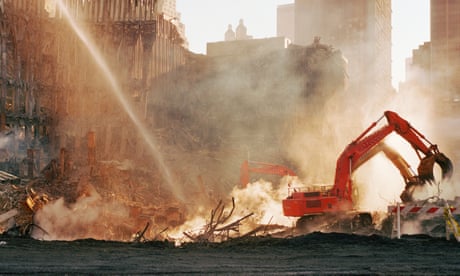
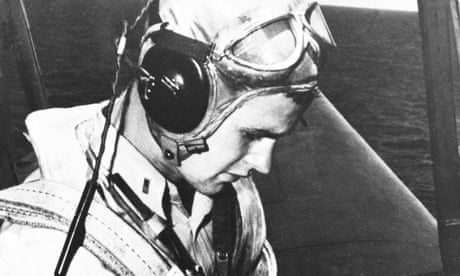
No comments:
Post a Comment